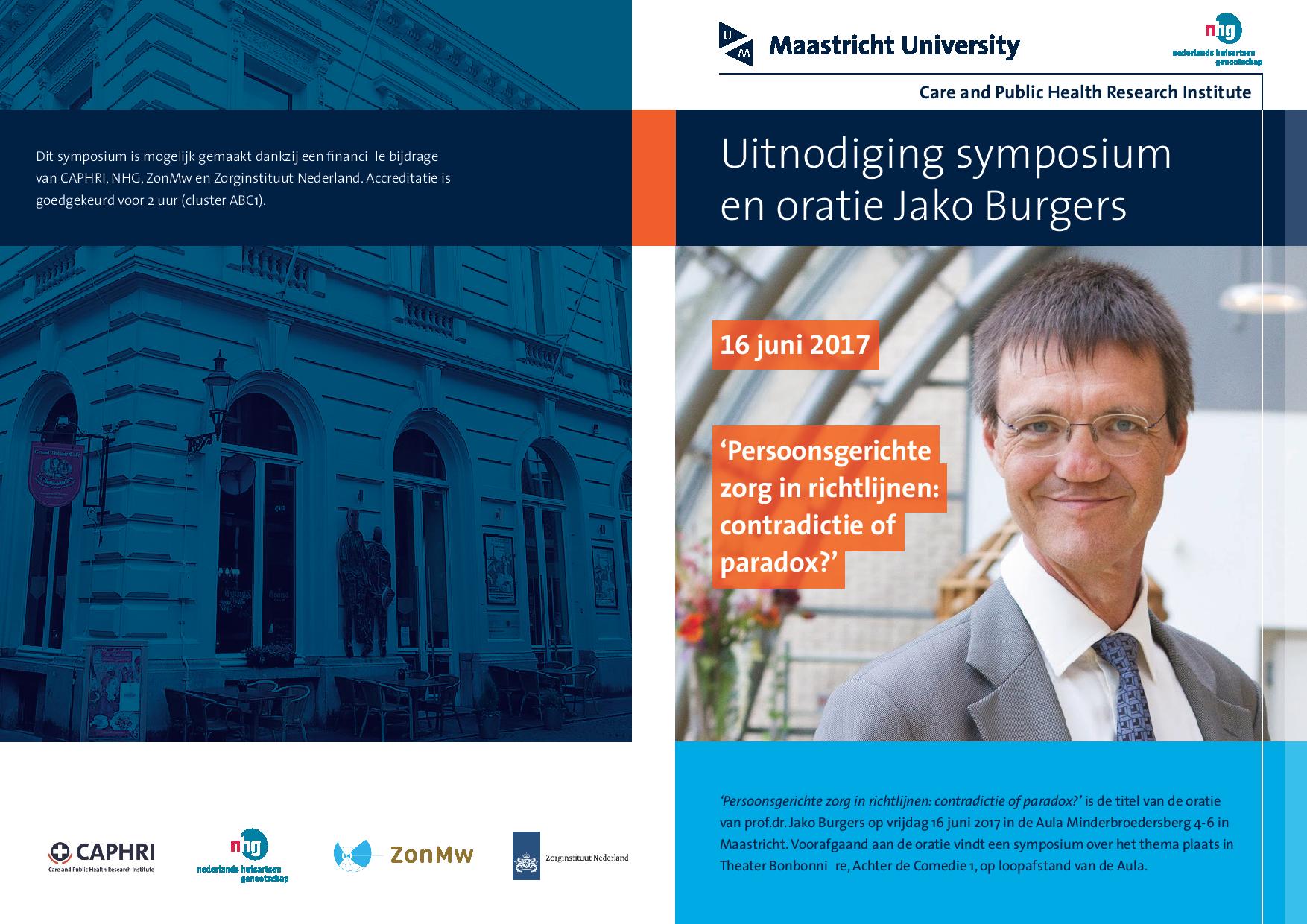Do guidelines impede a GP’s ability to provide personalised care?
On Friday 16 June, Professor Jako Burgers will deliver his inaugural lecture on whether Dutch health care guidelines are compatible with personalised care. Guidelines form an important source of up-to-date information and can be seen as a tool for introducing health care innovations. They are often based on the 'average patient', with no specific features or characteristics; but in reality, prior medical history, social context and individual preferences make every patient unique. If these factors are not taken into consideration, guidelines may impede the provision of personalised care. According to Burgers, guidelines and personalised care are not mutually exclusive; rather, they strengthen one another. Burgers was appointed by the Dutch College of General Practitioners (NHG) as strategic chair of Personalised Care in Clinical Practice Guidelines at the department of Family Medicine at Maastricht University's Faculty of Health, Medicine and Life Sciences.
Standards
The NHG has developed guidelines to support general practitioners since 1989. 'This was necessary due to the increasing pressure to refer patients to medical specialists,' explains Burgers. As a result, GPs were seen more as gatekeepers rather than independent physicians. In response, the NHG developed standards to demonstrate that GPs were more than capable of diagnosing and treating patients at their general practices instead of referring them on to a secondary health care provider. These standards were implemented for diabetes, ankle sprains, miscarriages and other conditions. 'Other countries are envious of our primary health care system, our GP training programmes and the number of students interested in becoming a GP. That's something we should be proud of,' says Burgers.
Resistance
The use of guidelines as the bedrock of this work was initially met with resistance, but that was quickly overcome. These days there are even more guidelines, which is prompting even greater resistance. 'Some GPs apply these guidelines conscientiously, while others are convinced they know what's best for their patients, believe their patients are happy with the care they receive and want to carry on doing what they're doing,' says Burgers. The chair position aims to ensure that all involved parties shift their focus to the original purpose of the guidelines, which is to provide a useful tool in the decision-making process and the policy practices of general practitioners.
Consultation room
In his inaugural lecture, Professor Burgers stressed that the elements of good care have to be determined in the consultation room – in the dialogue between GPs and patients – based on the knowledge provided by the guidelines. With this chair position, Burgers hopes to create more clarity on how GPs and patients deal with the knowledge acquired through these guidelines. 'It's about finding the right combination,' explains Burgers. 'GPs shouldn't blindly follow the guidelines, but they also shouldn't rely entirely on their own experience, as this will impede their ability to acquire new insights. It's about applying their prior knowledge and experience in their dialogue with patients in the consultation room. Promoting personalised care that is supported by guidelines forms the basis of my chair position.'

Professor Jako Burgers will deliver his inaugural lecture on Friday 16 June at 16.30 at Maastricht University’s auditorium at Minderbroedersberg 4–6 in Maastricht.
His lecture will be preceded by a symposium entitled, 'Guidelines for Personalised Care: Contradiction or Paradox?' The symposium will be held from 12.30 to 15.30 in Theater Bonbonnière at Achter de Comedie 1 in Maastricht.
Also read
-
In honour of the presentation of the VNVA Els Borst Prize for her oeuvre, Prof Marlies Bongers is organising the symposium "menstruation in RED on the agenda" on 1 October.
-
In women trying to conceive, 1-3% experience repeated miscarriages. For more than 50% of these women, a cause for the miscarriages has yet to be found. New research from Maastricht University (UM) and the Maastricht University Medical Centre+ (MUMC+) shows that the immune system’s Natural Killer (NK...
-
The European Commission has awarded €23 million to set up a new platform for drug repurposing: the use of existing drugs in diseases other than those for which they were originally developed. In the next seven years UM will develop the platform REPO4EU (precision drug REPurpOsing for Europe)...


